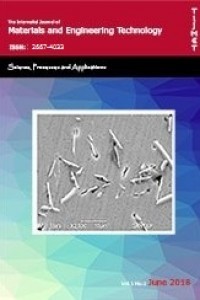THERMAL SEAL FORCE OF COATED BIDIRECTIONAL STRETCHED PET FILM USED IN FOOD PACKAGING INDUSTRY
THERMAL SEAL FORCE OF COATED BIDIRECTIONAL STRETCHED PET FILM USED IN FOOD PACKAGING INDUSTRY
___
- [1] Aithani, D., Lockhart, H., Auras, R., & Tanprasert, K. (2006). Heat sealing measurement by an innovative technique. Packaging Technology and Science: An International Journal, 19(5), 245-257.
- [2] Leminen, V., Mäkelä, P., Tanninen, P., & Varis, J. (2015). Leakproof heat sealing of paperboard trays-Effect of sealing pressure and crease geometry. BioResources, 10(4), 6906-6916.
- [3] Morris, B. A. (2016). The science and technology of flexible packaging: multilayer films from resin and process to end use. William Andrew.
- [4]Mihindukulasuriya, S., & Lim, L. T. (2012). Effects of Liquid Contaminants on Heat Seal Strength of low‐density polyethylene Film. Packaging Technology and Science, 25(5), 271-284.
- [5] Nisticò, R. (2020). Polyethylene terephthalate (PET) in the packaging industry. Polymer Testing, 106707.
- [6] Peiffer, H., Janssens, B., Hilkert, G., & Broemmel, P. (2008). U.S. Patent No. 7,329,453. Washington, DC: U.S. Patent and Trademark Office.
- [7] Mueller, C., Capaccio, G., Hiltner, A., and Baer, E. (1998). Heat sealing of LLDPE: Relationships to melting and interdiffusion. Journal of Applied Polymer Science, 70(10).
- [8] Hishinuma, K. (2009). Heat sealing technology and engineering for packaging (1st ed.). Lancaster, Pennsylvania 17602 U.S.A.: DEStech Publications, Inc.
- [9] Aiyengar, R., & Divecha, J. (2012). Experimental and statistical analysis of the effects of the processing parameters on the seal strength of heat sealed, biaxially oriented polypropylene film for flexible food packaging applications. Journal of Plastic Film & Sheeting, 28(3), 244-256.
- [10]ASTM. American Society for Testing and Materials Standard Test. 2009. Method for Seal Strength of Flexible Barrier Materials. F88/F88M-09. West Conshohocken, PA.
- [11] Myers, R. H., Montgomery, D. C., & Anderson-Cook, C. M. (2016). Response surface methodology: process and product optimization using designed experiments. John Wiley & Sons
- [12] Box, G. E., & Draper, N. R. (1987). Empirical model-building and response surfaces (Vol. 424). New York: Wiley.
- [13] Değirmencioğlu, A., & Yazgı, A. (2006). Tepki Yüzeyleri Metodolojisi" Optimizasyon Esaslı Çalışmalara İlişkin Teorik Esaslar ve Tarımsal Mekanizasyon Uygulamaları". Tarım Makinaları Bilimi Dergisi, 2(2), 111-115.
- [14] Tekindal, M. A. (2009). Yanıt Yüzeyi Metodu ve Bir Uygılama, Yüksek Lisans Tezi, Gazi Üniversitesi, Fen Bilimleri Enstitüsü, İstatistik Anabilim Dalı.
- Yayın Aralığı: Yılda 2 Sayı
- Başlangıç: 2018
- Yayıncı: Necip Fazıl YILMAZ
OPTIMUM DESIGN OF OVERHEAD CRANE CONSTRUCTION USING THE BEES ALGORITHM
Sami YEŞİLBEL, Mahmut ÇİMEN, Mete KALYONCU
ENERGY, ENVIRONMENT AND ECONOMY ASSESSMENT OF WASTE HEAT RECOVERY TECHNOLOGIES IN MARINE INDUSTRY
Hasan Mithat DELİBAŞ, Erhan KAYABAŞI
THE EFFECTS OF PUNCH SPEED ON THE FORGING LOAD OF HOT PRECISION BEVEL GEAR FORGING
Mehmet ALADAĞ, Ömer EYERCİOĞLU, Gülağa TAŞ
STRUCTURAL AND SURFACE PROPERTIES OF GLASS POWDER COATED Cr STEELS
Ayşe Nur ACAR, Doğan KAYA, Abdul Kadir EKŞİ, Ahmet EKİCİBİL
Development and Validation of Molecular Imprinted Sensors and Applicatıons to Real Samples
Nermin OZCAN, Bahar BANKOĞLU YOLA, Asiye ŞAHİN, Necip ATAR, Mehmet Lütfi YOLA
THERMAL SEAL FORCE OF COATED BIDIRECTIONAL STRETCHED PET FILM USED IN FOOD PACKAGING INDUSTRY
USING SEEKER OPTIMIZATION ALGORITHM TO DESIGN M-STUB IMPEDANCE MATCHING CIRCUITS
MODELING AND OPTIMUM PARAMETERS OF CO2 LASER MIG HYBRID WELDING PROCES
Recep TÜRKOĞLU, Levent AYDIN, Elif GÜLTÜRK
THE CORROSION EFFECT of CuO and ZnO FORMATIONS ON BRASS SURFACE
Abdulcabbar YAVUZ, Mahmut Furkan KALKAN, Necip Fazıl YILMAZ
PRODUCTION OF CATHODE COPPER FROM LEACH LIQUOUR BY SELECTIVE ELECTROWINNING PROCESS
